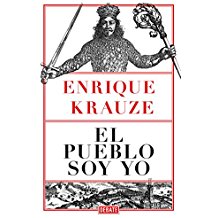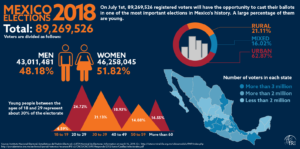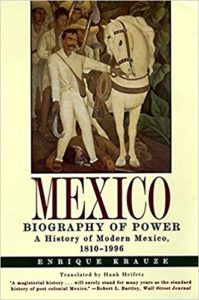 Sick of corruption and violence will Mexico’s voters embrace the maverick leftist Andrés Manuel López Obrador (left), popularly known as AMLO? Jon Lee Anderson asks in the New Yorker.
Sick of corruption and violence will Mexico’s voters embrace the maverick leftist Andrés Manuel López Obrador (left), popularly known as AMLO? Jon Lee Anderson asks in the New Yorker.
Historian and commentator Enrique Krauze has been concerned about López Obrador ever since 2006, Anderson writes:
Before the Presidential elections that year, he published an essay titled “The Tropical Messiah,” in which he wrote that amlo had a religious zeal that was “puritanical, dogmatic, authoritarian, inclined toward hatred, and above  all, redemptory.” Krauze’s latest book—“El Pueblo Soy Yo,” or “I Am the People”—is about the dangers of populism. He examines the political cultures in modern Venezuela and Cuba, and also includes a scathing assessment of Donald Trump, whom he refers to as “Caligula on Twitter.” In the preface, he writes about López Obrador in a tone of oracular dismay. “I believe that, if he wins, he will use his charisma to promise a return to an Arcadian order,” he says. “And with that accumulated power, arrived at thanks to democracy, he will corrode democracy from within.”
all, redemptory.” Krauze’s latest book—“El Pueblo Soy Yo,” or “I Am the People”—is about the dangers of populism. He examines the political cultures in modern Venezuela and Cuba, and also includes a scathing assessment of Donald Trump, whom he refers to as “Caligula on Twitter.” In the preface, he writes about López Obrador in a tone of oracular dismay. “I believe that, if he wins, he will use his charisma to promise a return to an Arcadian order,” he says. “And with that accumulated power, arrived at thanks to democracy, he will corrode democracy from within.”
It comes as no surprise that although Mexico’s government has evidence to charge officials connected to one of the biggest corruption scandals in Latin American history, it is refusing to bring charges because they might hurt the governing party ahead of presidential elections. That’s the way things have worked in Mexico for decades, notes James A. Goldston, executive director of the Open Society Justice Initiative. What’s new is the growing power and determination of civil society to document abuses and push for change, he writes to the New York Times.
 If populism sweeps to power in Mexico, the country’s foreign policy will return to the 1930s, argues Richard G. Miles, the director of the U.S.-Mexico Futures Initiative at the Center for Strategic and International Studies. If Mexicans pick AMLO, as their next president in less than two weeks, as the polls seem to indicate they will, he writes for Foreign Policy, then the country’s foreign policy could take a sharp turn to the left — and relations with the United States could fall into new depths, adds Miles, who handled Mexican affairs on the U.S. National Security Council staff from 2007 to 2008.
If populism sweeps to power in Mexico, the country’s foreign policy will return to the 1930s, argues Richard G. Miles, the director of the U.S.-Mexico Futures Initiative at the Center for Strategic and International Studies. If Mexicans pick AMLO, as their next president in less than two weeks, as the polls seem to indicate they will, he writes for Foreign Policy, then the country’s foreign policy could take a sharp turn to the left — and relations with the United States could fall into new depths, adds Miles, who handled Mexican affairs on the U.S. National Security Council staff from 2007 to 2008.
 What worried Krauze, was that if López Obrador’s party won big—not just the Presidency but also a majority in Congress, which the polls suggest is likely—he might move to change the composition of the Supreme Court and dominate other institutions, the New Yorker’s Anderson adds:
What worried Krauze, was that if López Obrador’s party won big—not just the Presidency but also a majority in Congress, which the polls suggest is likely—he might move to change the composition of the Supreme Court and dominate other institutions, the New Yorker’s Anderson adds:
He could also exercise tighter control over the media, much of which is supported by state-sponsored advertising. “Will he ruin Mexico?” Krauze asked. “No, but he could obstruct Mexico’s democracy by removing its counterweights. We’ve had a democratic experiment for the past eighteen years, ever since the PRI first lost power, in 2000. It is imperfect, there is much to criticize, but there have also been positive changes. I’m worried that with AMLO this experiment might end.”







